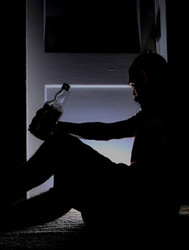The Link Between Alcohol Addiction & Bipolar Disorder
Posted by Adam Cook - AddictionHub.org on 2nd Jul 2016

Photo by Pixabay
There are many causes for alcohol abuse, and everyone reacts differently to the effects. But for people who suffer from mood and mental health disorders, alcohol addiction can greatly impact treatment and can make it more difficult for doctors and caregivers to assess the illness itself.
Because drugs and alcohol can dull the senses and help the sufferer feel they can cope with emotional pain, people suffering from schizophrenia and bipolar disorder are more at risk for addiction and addiction-related issues, such as depression and suicidal thoughts. In fact, in 1990 a study revealed that over 60% of people who suffered from bipolar disorder also dealt with a substance abuse problem.
Treatment for these disorders is made all the more difficult by drug and alcohol abuse, as noted by the National Institute on Alcohol Abuse and Alcoholism. Some people can only be diagnosed with bipolar disorder after their substance abuse issues have been treated.
Bipolar disorder is characterized by manic displays of emotion, depression, and a tendency toward having difficulty expressing oneself with speech. Such a manic episode can include feeling very high energy, behaving in reckless ways, trouble sleeping or speaking or thinking very quickly with the inability to organize thoughts, and becoming agitated easily.
However, they can also include the opposite reactions to moods: sleeping too much, having a change in appetite, decreased energy and activity levels, feeling hopeless or worthless, and forgetting things easily. These “down” episodes can be signs of depression, which can lead to suicidal thoughts. When left undiagnosed, bipolar disorder can lead to alcohol abuse because the sufferer is seeking relief from their own moods and feelings.
Because alcohol abuse can present similar symptoms to bipolar disorder and can alter moods and behaviors even more, it creates even more challenges for healthcare providers when it comes time to diagnose and treat the patient. However, it is imperative that both issues are treated in order for the sufferer to move toward recovery.
If bipolar disorder is diagnosed, it’s important for the patient to stay on any medications prescribed and to take the correct dosage. A disruption in meds can be harmful and can cause a relapse or a manic episode and can even cause withdrawal symptoms, which can affect physical health.
It’s also important that recovery steps be taken for the alcohol abuse with the knowledge that relapses can happen, and that preventative measures should be taken to ensure that the health and safety of the patient remains a priority. For instance, friends and family can help with support so that the patient doesn’t allow old influences to drive them back to drinking.
While there are many different treatment options available for those suffering from bipolar disorder, it may be that a combination of therapy and medication works best. No two people require the same treatment, mostly because the root causes of alcohol abuse vary from person to person. If you or a loved one is having any of these issues, it’s important to remember that you are not alone and that help is available.
Adam Cook has a strong understanding of the devastation that can be caused by addiction. He recently lost a close friend to an addiction-related suicide. In an effort to better educate himself and to help others, he created AddictionHub.org, a site that provides addiction and mental health resources. When he isn’t working or adding to his website, he’s prepping for his first triathlon.


